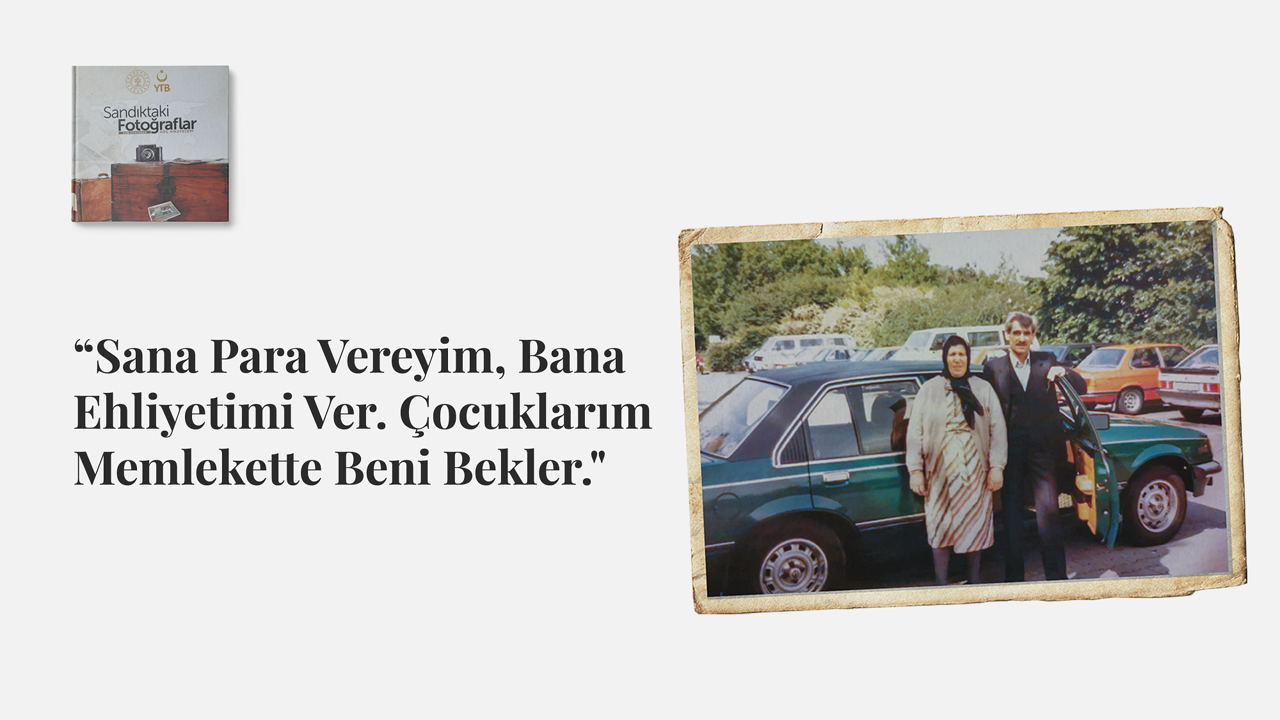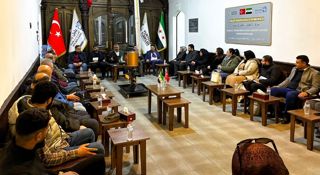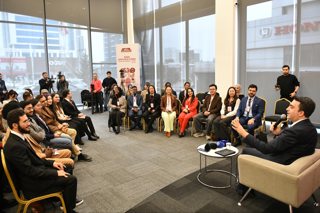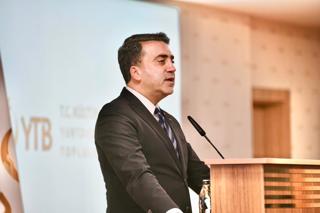"Please give me my driver’s license, I'll give you money. My children are waiting for me in my country."
Pazartesi, Ağustos 19, 2024
My grandfather couldn't get his driver's license for a long time since he was illiterate. He enrolled in a driver's license course and took the exams without understanding the lessons. But he always failed and could never pass the test. One day, my grandfather couldn't help himself and begged his driving instructor with tears in his eyes; "Please give me my driving license, I'll give you money. I have children, they are waiting for me in my country."
Thousands of Turkish citizens moved to Europe thinking that they would work for a few years, earn money and return home as soon as possible. While some of them returned, some of them stayed there and raised their third generation. At that time, Türkiye lacked the necessary work on the labor and labor rights of immigrants, so those who went first had a great difficulty. They had a hard time due to the culture shock they experienced and clung to their culture. The voices were foreign, the faces were foreign, even the birds that flew above them were foreign. My grandfather was one of them. He took good care of himself, he was always clean-shaved, his shoes were immaculately polished, and he looked sharp with well-ironed shirts and pants. My grandfather was a very handsome man. And he was a very independent and no-nonsense guy.
In 1969, he said goodbye to his family and headed to Munich. He was leaving his country, his loved ones, his wife and children, everything he was used to, and starting a brand-new life in a country, which he had never known and never even seen a street. It was very difficult at first. He worked on a construction site, cleaning up the garbage and toilets. He worked non-stop, he wanted to save money and go back to his hometown as soon as possible. Together with people from different countries, he lived in a collective dormitory called "Heim" -, sharing the same bathrooms and toilets with other people. Everyone slept on bunk beds and had a very small closet. He was not at all happy with this situation, but there was nothing he could do. He was the breadwinner, he endured this hardship and continued to work. Since they were strangers and did not know the way, they would go shopping with their friends and learn how to behave by observing each other. People who knew a little German and had a car were very valuable for them.
My grandfather's intention was to stay only a few years and then return, but fate had other plans. After living alone for five years, my grandfather brought my grandmother, Sultan Hanım and her children and they settled in Munich. They had been homesick for years, and at that time they were not able to visit Türkiye just like that . Those who had money visited Türkiye by bus and train, and those who had no money continued to feel homesick. My grandfather ate only enough to survive, saved all his money and bought a nice green car. But he did not have a driver's license yet. He learned to drive a car in the military, but he didn't get a driver's license thinking that learning would be enough. His friends told him that the law works differently here. You have to get your driver's license first, they said.
My grandfather could not get his driver's license since he was illiterate. He enrolled in a driver's license course and took the exams without understanding the lessons. He always failed and could not pass the tests. One day, my grandfather couldn't help himself but begged his driving instructor in tears; "Please give me my driving license, I'll give you money. I have children and they are waiting for me in my country. If you don't, I'll hang myself here with this rope." Now we laugh at these things, but I always think about that difficulty and the feeling that made him say these things in those days. It seems unthinkable how one could do such a thing, but desperation can make you do everything. Then he finally got his driver's license. My grandfather cared a lot about his car and took care of his car as he took care of himself. Every day after work, he would wash, wipe and dust his car. He even forbade us to enter his car with our shoes on, he was that fastidious. As soon as we got in the car, he would take off our shoes, put them in the trunk, and when we would get off, he would put our shoes on the floor, and we would wear our shoes when we got out of the car. Now, at the age of 81, he still drives in Türkiye and likes to take care of his car like it is his baby. Years later (1986), my uncle got married and went to Sweden, where he suffered and felt homesick. My grandmother was always sad and crying, and my grandfather was longing for his son.
My grandfather could not stand this longing, made preparations, packed food and supplies and set off with my grandmother. He drove to the north of Germany and arrived in Denmark, but he didn't know the roads. He pulled the car over on the highway, stopped passing cars and asked for directions. No one stopped, and those who stopped resumed their journey without answering his question since they did not understand him. My grandfather hitchhiked for hours and tried to stop all the cars. Noticing this situation, someone immediately called the police and complained, "There is a drunk guy here, he keeps stopping the cars." Not long after, the traffic police arrived, and asked "Was ist hier los?" (What's going on here?). My grandfather, who did not understand him, looked confused and said, "My Sohn (Son). There's Schweden Sohn (my son in Sweden). Straße Straße (Road Road)". The police couldn’t understand what my grandfather was saying, so they checked the presence of alcohol. My grandmother was crying and praying in the car. They saw that he was not drunk, he just did not speak the language. They immediately called the police station and asked for a Turkish translator and learned about his problem. After learning his problem, the policeman laughed and asked my grandfather to follow the police car and showed him the way.
We still talk about it and laugh about it, but my grandfather doesn't laugh much, he listens quietly. It was also difficult to visit Türkiye as a family. My grandfather never liked to travel by train since he had a very bad experience before. When he first arrived in Europe, the train was packed with expatriates and one of his friends accidentally rolled off the train. My grandfather was very shaken and cried for days. He always felt alone in Europe. Still, sometimes he remembers this event in his dream and he wakes up in tears. The journeys were difficult, life was difficult and longing was also difficult. Going to Türkiye was not an easy trip at that time since there was no navigation, the roads were half-built, foreign and dark while the cars were not very good. Their journey was very long and arduous. Although they had picnics, meals and games during their road trips to Türkiye, my grandfather used to tell me that they could not fully feel like as they were on a holiday in Türkiye.
My grandfather used to listen Neşet Ertaş's songs on the way to Türkiye. Both his journey to Türkiye and his return from Türkiye was painful for him. Those folk songs evoked feelings of bitterness and incompleteness in him.
We found ourselves in foreign lands
We missed our homelands
This invisible pain
Put us in a very miserable state
My poor heart feels so restless.
They felt so sad since they didn’t feel that they belonged somewhere. Being stuck between Germany and Türkiye sometimes make the Turkish people feel very depressed, as they hear this cliché "Germans in Türkiye, foreigners in Germany" a lot. Despite having done so much for both German and Turkish communities, they have been an unpopular minority throughout their lives. My grandfather was a very self-sacrificing person as a father and never lost his way, protecting his culture and values as a national duty.
"Bus journeys were not easy at that time"
I am a father, who misses the word "daddy". I know the pain of those who have been separated from their kids, I know the pain of those who have been homesick, I know the pain of those who have been separated from their children...
In this life, where poverty drove them to foreign lands, things did not go as planned. Their short-term travel turned into a long-term living experience, as they and all of their children started to work. At the beginning, the most important difficulties were housing shortages and high rents. However, sending money to their families staying in Türkiye was another problem. They also faced other important problems like the high commissions charged by the German banks and the issues of communication with their homeland. My father tells me that despite these difficulties, he overcame obstacles and he was successful at school. He was not shy and he asked his German neighbors about the parts of his lessons that he did not understand. They came across a very good German neighbor who helped them in every way. My father was still undecided whether he would continue his education or not, since he couldn't afford it. My father wanted to be a teacher, as he was interested in both literature and teaching children. Another test of life, when the fish falls in love with the desert… He could not get what he wanted, since he had to start working as soon as possible. It was though for them, since only my grandfather was working at that time, so my father thought, "I should start working as soon as possible." What could he do? He was a pastry chef in Türkiye, so he found a job close to him and started to work in a bakery. But his deep interest in literature never faded, as he continued to collect books and read poems.
An incident led my father to start working: One day, my grandfather went to the mosque and had his iftar (the evening meal during Ramadan fast) there. As he was leaving the mosque after the Tarawih prayer, the imam distributed candy and everyone had one candy. When he came home, my devoted grandfather divided the candy into 5 pieces since everyone wanted a piece of it . This incident took a toll on my father, he hid his tears and cried in his room. He thought "I should get a job and start working right away". My father found a job and was now earning his own pocket money and contributing to his family financially. In his spare time, he read books and wrote poems about his longing for my mother. Then he married my mother and became a father in 1988, and his longing doubled as he started to miss his child as well. He sent me letters and children's books, and occasionally published poems about his longing in the newspapers. He has accumulated so many books that we have now placed his books in the most beautiful corner of the library. He developed his writing skills, and his articles about love, longing and expatriation were published in the newspapers. On the one hand, he was working, on the other hand, he continued to write and read. He visited us maybe twice in three years to stop his longing, but he returned before he could satisfy his yearning. My father used to tell me that he used to dream about bus travels and read a lot of articles. These bus trips always remind him of those days. Lonely journeys cause people to turn inward. On these journeys, my father listened to his inner voice and put it on paper. He doesn't do these things to make someone like him; just to console himself, to satisfy his yearning and to heal his soul . At that time, bus journeys were not easy. Three years later, he was rewarded for his work and brought us to Munich. We had slowly settled here. We all lived in a small house and were very happy. My mother describes the first days she came: It was a very big city, with huge buildings. The sky was foreign, the air was foreign. I was always holding your hand tightly due to the fear that you would be lost. I was afraid of the people here, and when I was alone at home , I couldn't approach the window because of my fear, thinking that people could see me. They came directly to Europe from the village, and before they had seen Istanbul. This shock had shaken them a lot, it took time to get used to it. My father supported my mother in everything so that she would not feel lonely. He loved my mother very much, there was a very strong connection between them , and we still see and feel this connection today. My father got used to these places more easily, since the woman he loved and his children were with him. Maybe my father didn't have an extraordinary life story, he lived a simple life. He embraced books and poems, avoided every appearance of evil in foreign lands, and was always loyal to his wife and children
Tuba Çıtak, Orthopedic Technician / Munich - Germany



